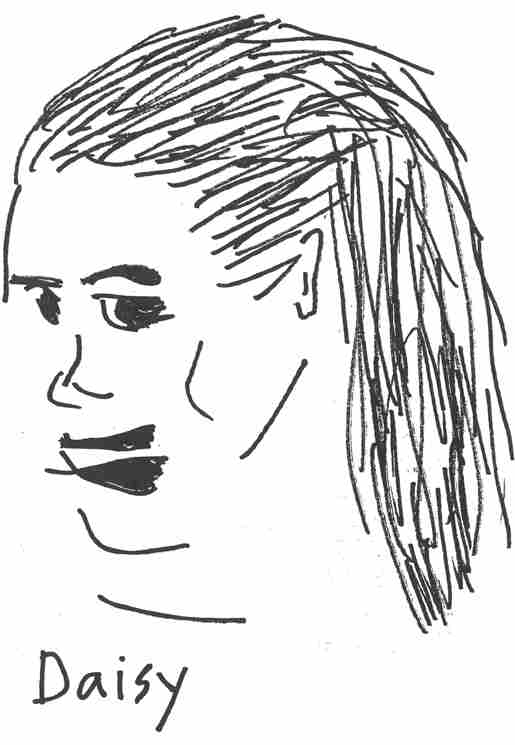The piano teacher, Bill, was a tall, slender man in his mid-thirties. He had wispy, thinning brown hair, and his concave posture gave those in his presence the unsettling feeling that his body could at any moment crumple into thirds. He wore wire-rim glasses and always spoke gently and encouragingly to Roy’s daughter, Daisy, then eight years old, who was his student. Roy liked Bill. He told Roy that Daisy had some musical talent and it seemed to Roy that they genuinely enjoyed one another’s company.
Bill did mention to Roy, however, that Daisy could be obstinate on occasion; that if she had a problem getting something right, even though he told her to let it go for the moment, that they could come back to it later, Daisy would often insist on working on the passage until she was at least satisfied with her progress. This kind of perseverance, Bill said, impressed him. He had seldom encountered a student so young who exhibited this degree of tenacity.
Daisy practiced less than she should have, Roy thought, but she said she liked taking piano lessons, so he did not mind paying for them even though it was an expense Roy barely could afford.
When it came time for her first recital, Daisy practiced the piece Bill had chosen for her to perform more diligently than usual. Roy noticed how her technique improved over the two or three weeks she rehearsed it. Bill mentioned to him how pleased he was by Daisy’s dedication and on a Thursday after practice, two days prior to the recital, happily pronounced her performance-ready.
On Saturday Roy accompanied Daisy to Finnish Hall, a white wooden building constructed at the turn of the century (the twentieth) by the Scandinavian community in their town. As the other participants, also accompanied by their family members and friends, filed into the hall, Roy noticed how many of the children—most well-dressed for the occasion—had worried expressions on their faces. Daisy, though she may also have been nervous, seemed calm.
The recital was organized according to age and skill levels. Daisy’s group was to be last among five, and she had been scheduled seventh of the nine participants in her category. Finnish Hall was a pleasant venue in which to sit; the amber walls and hardwood flooring lent a soothing feeling to the proceedings. Daisy and Roy listened attentively to the other children as they played, and finally, after more than an hour, her turn came.
Daisy did not look at her father or at Bill before she stood and walked to the piano. A woman read aloud Daisy’s name from a list, as she had for every child, and Daisy took her seat at the piano and began to play.
From the beginning Roy knew—and certainly Bill knew—that something was amiss. Daisy stumbled at the start, began again, continued to stumble but kept on despite hitting one wrong note or chord after another. When she finished, the audience applauded hesitantly and with considerably less enthusiasm than they had the efforts of the previous students. Either this child had a terrible case of nerves—in which case they might have been more generous in their response—or perhaps, the witnesses concluded, Daisy had simply not practiced properly and was ill-prepared for the event.

While Daisy played, Bill and Roy exchanged looks of puzzlement, and for good reason: she was attempting to play a piece other than the one she had so dedicatedly rehearsed. At the conclusion of her performance, Daisy immediately stood and walked back to her seat, took it, and stared straight ahead, not so much as glancing at Bill or Roy. Her father had seen that there were tears in her eyes, and he knew that she was struggling to hold them back. Roy said nothing to her while they sat and listened to the last two children play.
After the recital had concluded, Bill went over and sat next to Daisy. He asked her why she had not played the intended piece. There were still tears in Daisy’s eyes, but Roy thought that she had fought past the urge to cry.
“Because three of the kids before me played it,” Daisy told them, “I thought it would be better if I played a different one.”
“But you hadn’t practiced that piece,” said Bill, very gently. “You weren’t ready to play it.”
Daisy sat for a moment without saying anything else, then she turned and looked at her father.
“I didn’t want to be the same as everyone else,” she said. “I’m sorry, Daddy.”
Big tears rolled down her cheeks. Roy took her onto his lap and held her as she wept. Most of the other children and their families and friends had left the room.
Bill patted her softly on the back.
“You’re a special person, Daisy,” he said, “you really are.”
“Come on, baby,” Roy said to her, “let’s get an ice cream.”